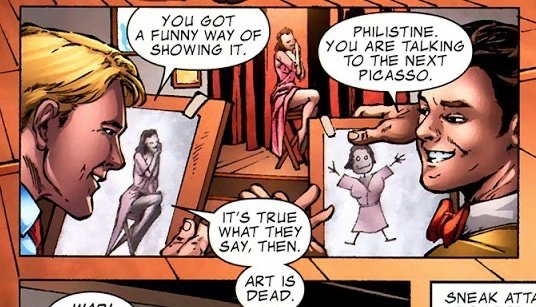Hold on, hold on. I have to protest.
Do you think I would choose to live without you?
― Anne Carson, Euripides
The relationship between Orestes and Pylades has been presented by some authors of the Roman era as romantic or homoerotic. The dialogue Erotes ("Affairs of the Heart"), attributed to Lucian, compares the merits and advantages of heterosexuality and homoeroticism, and Orestes and Pylades are presented as the principal representatives of a loving friendship:
- “Phocis preserves from early times the memory between Orestes and Pylades, who taking a god as witness of the passion between them, sailed through life together as though in one boat. Both together put to death Klytemnestra, as though both were sons of Agamemnon; and Aegisthus was slain by both. Pylades suffered more than his friend by the punishment which pursued Orestes. He stood by him when condemned, nor did they limit their tender partnership to the bounds of Greece, but sailed to the farthest boundaries of the Scythians – the one sick, the other ministering to him. When they had come into the Tauric land, straightaway they were met by the matricidal fury; and while the inhabitants were standing round in a circle, Orestes fell down and lay on the ground, seized by his usual condition, while Pylades ‘wiped away the foam, tended his body, and covered him with his well-woven cloak’ – acting not only like a brother but like a father too. When it was determined that one should remain to be put to death, and the other should go to Mycenae to convey a letter, each wishes to remain for the sake of the other, thinking that if he saves the life of his friend, he saves his own life. Orestes refuses to take the letter, saying that Pylades was more worthy to carry it, acting more like the older lover than the younger. ‘For,’ he said, ‘the slaying of this man would be a great grief to me, as I am the cause of these misfortunes.’ And he added, ‘Give the tablet to him, for (turning to Pylades) I will send thee to Argos, in order that it may be well with thee; as for me, let anyone kill me who desires it.’ Such love is always like that; for when from boyhood a serious love has grown up and it becomes adult at the age of reason, the long-loved object returns reciprocal affection, and it is hard to determine which the lover of which, for – as from a mirror – the affection of the lover is reflected from the beloved.” (47, W. J. Baylis)
AND NOW, THE FAMOUS
SCENE/DIALOGUE UPDATED
FOR MODERN TIMES --
totalfuckingbitch-deactivated20




















































